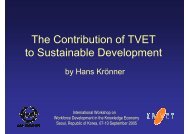Learning for Life, Work and the Future Initial ... - Unesco-Unevoc
Learning for Life, Work and the Future Initial ... - Unesco-Unevoc
Learning for Life, Work and the Future Initial ... - Unesco-Unevoc
Create successful ePaper yourself
Turn your PDF publications into a flip-book with our unique Google optimized e-Paper software.
Page 72 Participants’ Papers <strong>Learning</strong> <strong>for</strong> <strong>Life</strong>, <strong>Work</strong> <strong>and</strong> <strong>the</strong> <strong>Future</strong><br />
Training Fund oversees training <strong>for</strong> entrepreneurship<br />
development.<br />
The in<strong>for</strong>mal sector in Africa is now <strong>the</strong> area of <strong>the</strong><br />
fastest <strong>and</strong> most significant business growth, employing<br />
<strong>the</strong> largest number of working people <strong>and</strong> creating<br />
more new jobs per year than any o<strong>the</strong>r sector. By<br />
reducing rural to urban migration, <strong>and</strong> <strong>the</strong>re<strong>for</strong>e<br />
reducing unemployment <strong>and</strong> social problems in urban<br />
areas, it is <strong>the</strong> in<strong>for</strong>mal sector that holds <strong>the</strong> key to <strong>the</strong><br />
future development of Africa.<br />
21 MWANUKUZI-KWAYU, Christine (United Republic of Tanzania):<br />
Training in <strong>and</strong> <strong>for</strong> <strong>the</strong> In<strong>for</strong>mal Sector − A Case Study of Opportunities<br />
Industrialisation Centres of Tanzania Training Programmes<br />
1. The Situation of <strong>the</strong> In<strong>for</strong>mal Sector in Tanzania<br />
Up to <strong>the</strong> early 1990s, <strong>for</strong>mal wage employment was<br />
<strong>the</strong> most important source of employment in Tanzania,<br />
growing consistently at an average annual rate of 3%<br />
between <strong>the</strong> 1960s <strong>and</strong> 1980s. At its peak in <strong>the</strong> 1990s<br />
<strong>the</strong> <strong>for</strong>mal sector had 800,000 employees, 80% of<br />
whom were in <strong>the</strong> public sector. However, due to <strong>the</strong><br />
ongoing civil service re<strong>for</strong>ms <strong>and</strong> parastatal sector<br />
restructuring, public sector employment has declined to<br />
about 50% of <strong>the</strong> total.<br />
Since <strong>the</strong> mid-1980s, largely in response to <strong>the</strong> growing<br />
economic crisis, <strong>the</strong> in<strong>for</strong>mal sector has become<br />
increasingly important as a source of employment<br />
opportunities. It is now estimated that about 22% of<br />
<strong>the</strong> labour <strong>for</strong>ce is engaged in <strong>the</strong> in<strong>for</strong>mal sector as a<br />
main or secondary activity.<br />
In an attempt to provide opportunities <strong>for</strong> self-employment,<br />
<strong>the</strong> government has initiated a number of<br />
employment creation programmes in <strong>the</strong> in<strong>for</strong>mal<br />
sector, with technical <strong>and</strong> financial support from donor<br />
agencies. One of <strong>the</strong>se is <strong>the</strong> National Income<br />
Generation Programme (NIGP).<br />
The NIGP is a multi-donor funded programme mainly<br />
funded by <strong>the</strong> United Nations Development Programme<br />
(UNDP). It focuses on income-generating<br />
skills development <strong>and</strong> is implemented by <strong>the</strong> Opportunities<br />
Industrialisation Centres of Tanzania (OICT),<br />
with technical support from Opportunities Industrialisation<br />
Centres International (OICI).<br />
The preliminary needs assessed during <strong>the</strong> establishment<br />
of OICT in 1993 were lack of entrepreneurial <strong>and</strong><br />
general management skills on <strong>the</strong> one h<strong>and</strong> <strong>and</strong> technical<br />
skills on <strong>the</strong> o<strong>the</strong>r. Fur<strong>the</strong>r studies <strong>and</strong> reports 1<br />
conducted <strong>for</strong> <strong>the</strong> in<strong>for</strong>mal sector indicated that small<br />
business operators experience <strong>the</strong> following four main<br />
problems: lack of finance to start or exp<strong>and</strong> business<br />
activities, lack of basic business management <strong>and</strong><br />
technical skills, limited access to markets <strong>and</strong> a poor<br />
enabling environment.<br />
1 By <strong>the</strong> ILO, <strong>the</strong> Ministry of Labour, <strong>the</strong> World Bank, <strong>the</strong> UNDP <strong>and</strong><br />
o<strong>the</strong>r development agencies.<br />
Due to this situation, <strong>the</strong> overall objective of <strong>the</strong> OICT<br />
skills training project was to improve <strong>the</strong> lives of<br />
unemployed Tanzanian youths <strong>and</strong> adults by providing<br />
<strong>the</strong>m with income-generating skills.<br />
Many of <strong>the</strong> problems frequently observed in <strong>the</strong><br />
in<strong>for</strong>mal sector are compounded by lack of knowledge<br />
of how to solve <strong>the</strong>m, though not all in<strong>for</strong>mal sector<br />
operators admit that training is a major part of <strong>the</strong><br />
solution to <strong>the</strong>se problems. Never<strong>the</strong>less, <strong>the</strong> more<br />
enlightened in<strong>for</strong>mal sector operators are ready to participate<br />
in training programmes because <strong>the</strong>y are aware<br />
that <strong>the</strong> ability to solve problems leads to improved<br />
productivity <strong>and</strong> higher income.<br />
2. Potential Areas of Collaboration<br />
Despite this awareness, <strong>and</strong> despite <strong>the</strong>ir willingness to<br />
be trained, one of <strong>the</strong> difficulties experienced by<br />
in<strong>for</strong>mal sector operators is finding time to attend<br />
training sessions. The level of output <strong>and</strong> productivity<br />
<strong>for</strong> many of <strong>the</strong>m is so low that <strong>the</strong>y are compelled to<br />
work full-time, <strong>and</strong> lack of savings makes operators<br />
unwilling to take time off to attend a training programme,<br />
let alone pay <strong>for</strong> it. Under <strong>the</strong>se conditions,<br />
<strong>the</strong> opportunity cost of attending training is very high,<br />
<strong>and</strong> operators would only be prepared to attend training<br />
programmes if <strong>the</strong>y perceived that <strong>the</strong> benefits exceed<br />
<strong>the</strong> cost (often <strong>the</strong> opportunity cost).<br />
Never<strong>the</strong>less, only about 15% of <strong>the</strong> operators 2 indicated<br />
that <strong>the</strong>y did not want to attend any training to<br />
improve <strong>the</strong>ir skills <strong>and</strong> business management; <strong>the</strong> rest<br />
showed an interest in attending skills upgrading as well<br />
as some <strong>for</strong>m of business management.<br />
Enterprise development training might be an area <strong>for</strong><br />
subregional collaboration.<br />
3. Strengths <strong>and</strong> Weaknesses of <strong>the</strong> Country’s<br />
Response to Challenges<br />
One of <strong>the</strong> issues that have often been discussed concerning<br />
<strong>the</strong> training of in<strong>for</strong>mal sector operators is <strong>the</strong>ir<br />
ability to contribute to <strong>the</strong> cost of training. For reasons<br />
of programme sustainability, beneficiaries are expected<br />
2 OICT Baseline Survey, 1996.





